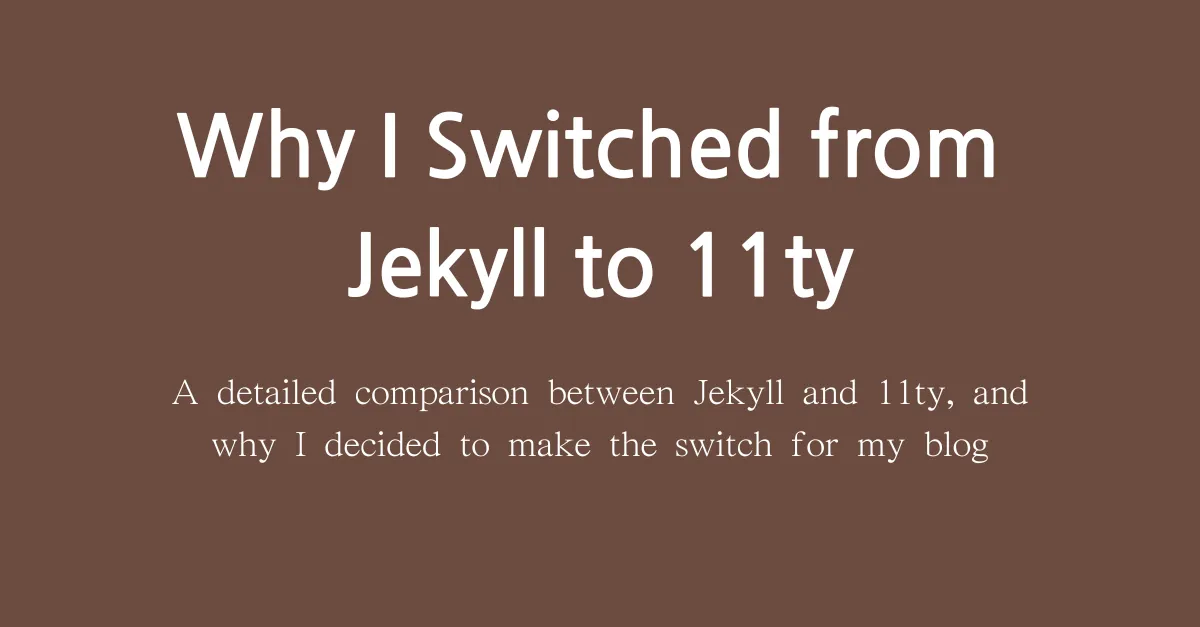
Why I Switched from Jekyll to 11ty
A detailed comparison between Jekyll and 11ty, and why I decided to make the switch for my blog.
Why I Switched from Jekyll to 11ty #
1. Comparing the Basics of Jekyll and 11ty #
Jekyll and 11ty are both static site generators that help build websites quickly and efficiently. However, they differ greatly in philosophy and usage.
- Jekyll is Ruby-based and is natively supported by GitHub Pages. It has long been a dominant player in the static site generator space, offering a wide range of plugins and themes that make it easy to get started.
- 11ty, on the other hand, is a newer, JavaScript-based static site generator. While it’s relatively young, it’s gaining attention for being flexible, fast, and seamlessly integrating with the JavaScript ecosystem.
After comparing the two, I decided to switch to 11ty to better meet my needs and suit my development environment.
2. Challenges Faced When Switching from Jekyll to 11ty #
One of the most significant challenges I faced during the switch was adapting to a different ecosystem. Since Jekyll is Ruby-based, transitioning to the JavaScript-based 11ty involved a learning curve. Specifically, I had to replace or find alternatives for the Jekyll plugins and themes I had previously relied on.
Additionally, 11ty is much more flexible in terms of directory and template structure, which meant I had to define a lot of the structure myself. While this flexibility is a benefit, it added a level of complexity compared to Jekyll, where many things are pre-configured. Some tasks that were straightforward in Jekyll required manual configuration in 11ty.
3. Speed Improvements with 11ty Compared to Jekyll #
The most noticeable improvement after switching to 11ty was the build speed. With Jekyll, as the number of posts or images increased, so did the build time. In some cases, Jekyll took several minutes to build a large site, and I had to optimize it with plugins and additional configurations.
In contrast, 11ty builds are incredibly fast. Even with dozens of posts, build times were reduced to just a few seconds, significantly speeding up my workflow. Since 11ty is JavaScript-based, it also integrates more naturally with client-side scripts, making the entire development process more efficient.
This difference in performance was so tangible that it reinforced my decision to switch to 11ty.
4. Dependencies and Customization #
Jekyll manages plugins and themes via Ruby Gems, which can be cumbersome for those unfamiliar with the Ruby ecosystem. I often encountered dependency issues and conflicts that took time to resolve, slowing down the development process.
On the other hand, 11ty’s JavaScript (Node.js) ecosystem made adding plugins and customizing configurations much easier. Since I’m more comfortable with JavaScript, integrating the necessary tools was straightforward and intuitive. Additionally, 11ty’s framework-agnostic design gave me the freedom to structure my files and directories as I saw fit, enhancing my control over the site’s architecture.
5. The Benefits and Growth Potential of 11ty #
Jekyll has been a reliable static site generator for years, but in recent times, its development has slowed. In contrast, 11ty’s rapidly growing community and active development offer exciting potential for future features and improvements. The integration with the JavaScript ecosystem means there’s a wealth of resources and tools available that can be used to enhance my projects.
One of 11ty’s other standout features is its support for multiple templating engines. While I primarily use Nunjucks, I appreciate the ability to switch to Liquid, Handlebars, or other engines as needed, which adds flexibility and efficiency to my workflow.
6. Conclusion #
Ultimately, I made the switch from Jekyll to 11ty for its speed, flexibility, and compatibility with JavaScript. While Jekyll is still a fantastic tool, I needed a solution that better aligned with my development preferences and project requirements. The seamless integration with the JavaScript ecosystem was a critical factor for me as a frontend developer.
The switch from Jekyll to 11ty has improved my workflow, provided a more flexible development environment, and I’m excited to continue expanding my blog using 11ty as it evolves in the future.
